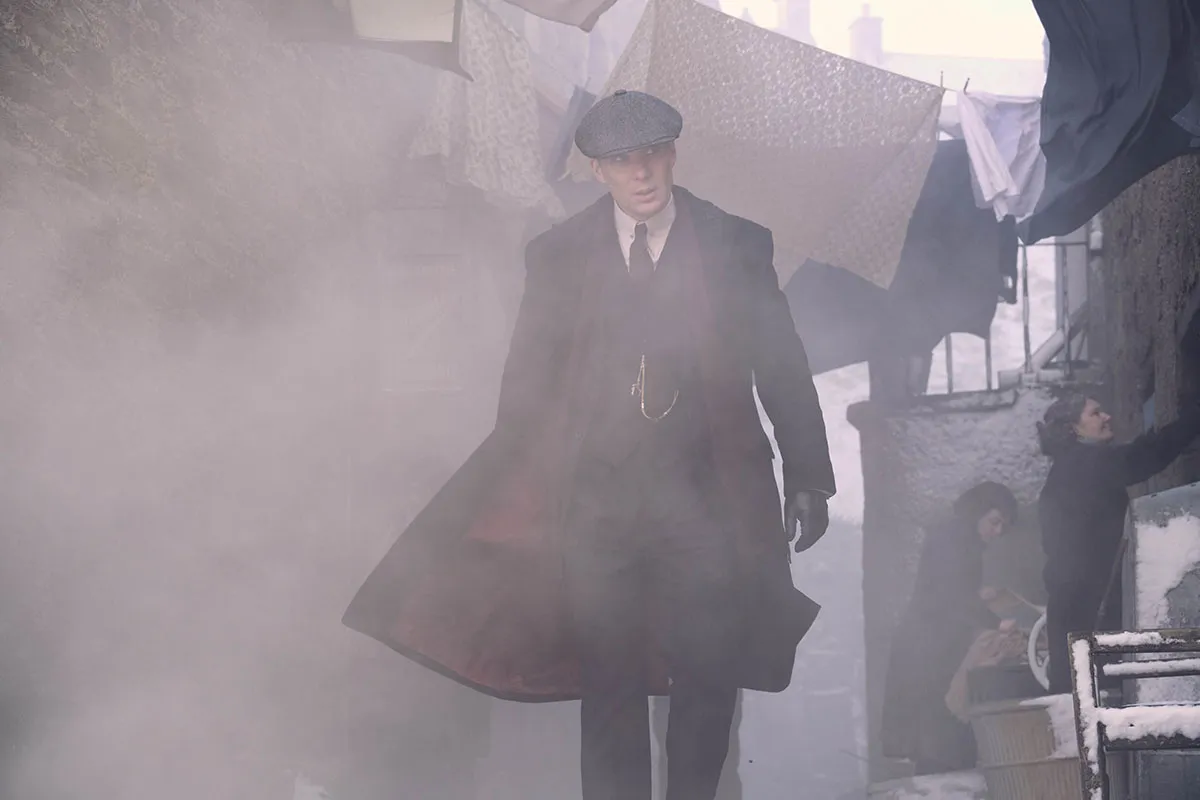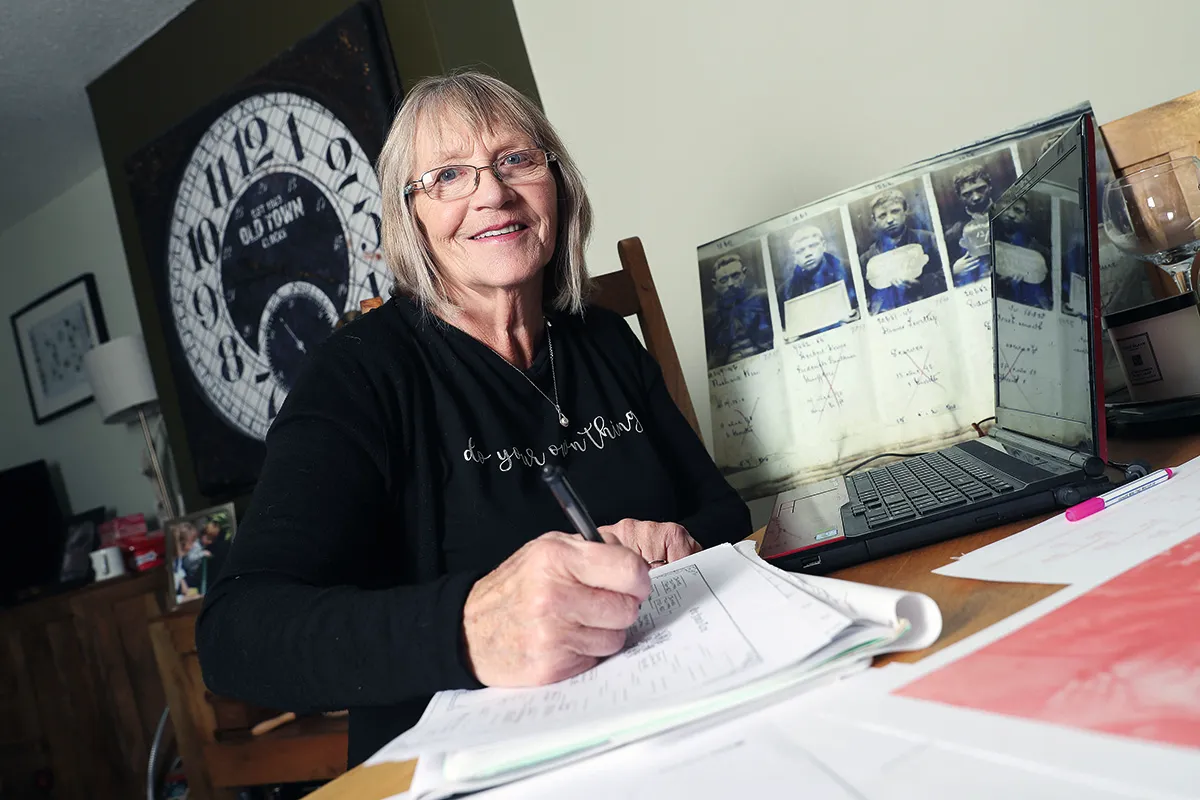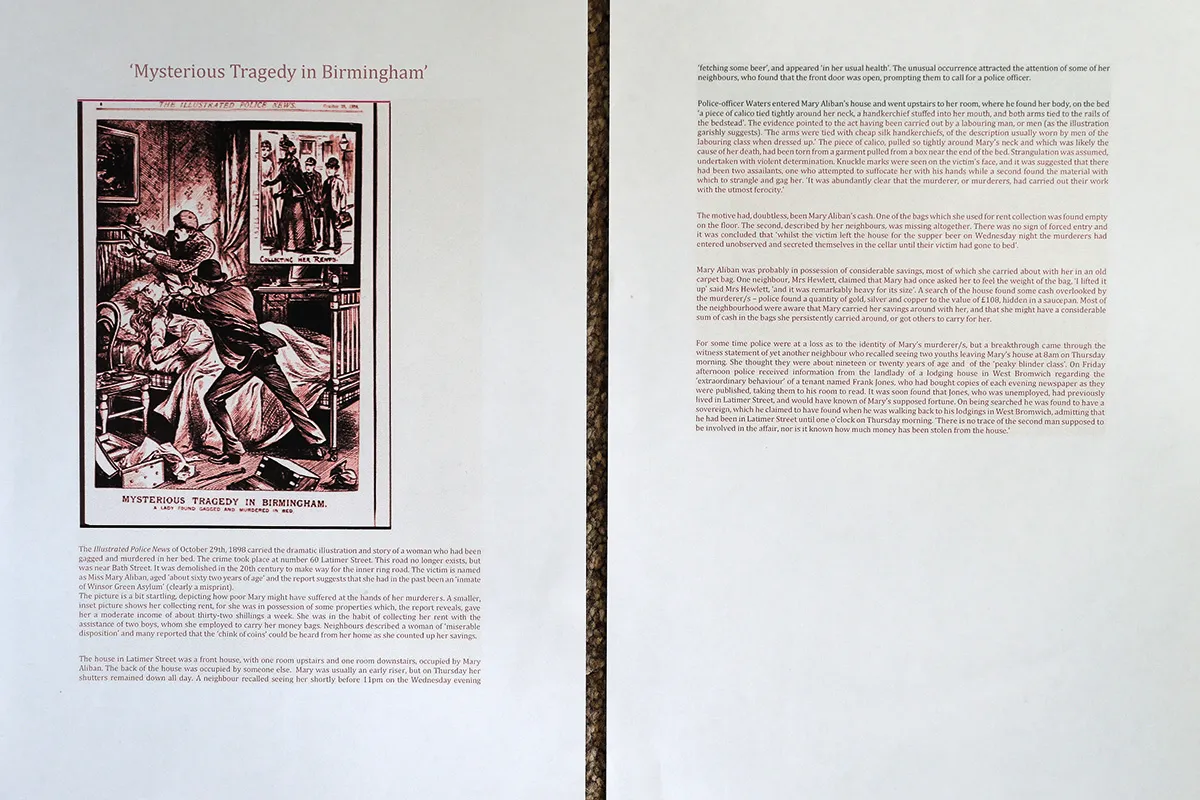On the night of 20 October 1898, Mary Ann Aliban headed out to buy her ‘supper beer’ from a local alehouse. She lived alone on Latimer Street, Birmingham, in a working-class area of back-to-back houses. The following day she was found dead.
Mary Ann, who was in her sixties, had been tied to a bed and gagged, and a handkerchief had been stuffed into her mouth. The postmortem revealed that she had suffocated when the handkerchief pushed her false teeth down her throat.
Robbery was clearly the motive, because Mary Ann owned houses nearby and would walk the neighbourhood collecting rent money which she stashed at home. The hue and cry went up for two young men who had been seen loitering in the area. They were described by witnesses as being of the ‘Peaky Blinder’ class.
These criminals were notorious in Birmingham long before the BBC drama Peaky Blinders began in 2013. They dominated the city’s Small Heath area from late Victorian times until the 1910s, engaging in racketeering, illegal bookmaking, robbery and violence. Their sartorial style was distinctive, and they often wore short bell-bottomed trousers, thick belts and peaked caps with blades sewn into them.

Bobbie Adams, who lives in Henley-in-Arden in Warwickshire, has found a family connection to the Peaky Blinders and the shocking death of Mary Ann Aliban. “I always knew that there was a murderer in the family,” Bobbie explains. “I discovered his identity while researching my paternal great grandfather, George Cornelius Twitty.
“George was born in Birmingham in 1893 and lived in Small Heath. His parents were respectable people who ran grocery and fruit businesses. I mapped out George’s family tree and found his second cousin once removed, James Twitty, whose life fell into chaos.”
James was born in 1875 and lived in Holliday Street, central Birmingham, near the canal. He was from a working-class background, and his father was a brass finisher. His mother died in 1886, when he was 11 years old.
As Bobbie began researching James it became clear that he fell into a life of crime during his early teens. He was listed in Ancestry’s collection ‘UK, Registers of Habitual Criminals and Police Gazettes, 1834–1934’. His offences ranged from petty theft, vagrancy and gambling to assaulting a police officer. The record noted that he also used an alias, Alfred Walters.

“I wanted to know why James had become a habitual criminal. He was often held at Birmingham’s Steelhouse Lane Lock-up, which is now the location of the West Midlands Police Museum. I visited it in 2017 to discover more.
“The museum has displays in its cells, and the first one I walked into had a board featuring five mugshots taken in 1890. The photographs were of a man and four teenage boys, all of whom were holding up a small blackboard with their name chalked on it.
“I could hardly believe my eyes. Staring back at me was the face of my relative, James Twitty. He had been arrested for stealing scarves, and sentenced to a month in prison. He was only 15.
“James was in the lock-up again in March 1892 after committing burglary, and this time he gave his alias, Alfred Walters. He was sentenced to nine months’ hard labour.
“Three more convictions followed, all with custodial sentences, and he had 12 summary convictions for vagrancy. James spent most of his teenage years doing hard labour in prison, begging or sleeping rough. He had no education, and appears to have been cast out by his family.
"James spent most of his teenage years doing hard labour in prison, begging or sleeping rough"
“As he got older, James used to work for a coal merchant in Merthyr Tydfil, South Wales. He was in and out of the town’s Thomas Street Workhouse, and was often kicked out for not working his keep.”
At the age of 23, James fell in with a criminal who would change the course of his life forever. On 19 October 1898, he spent the night in Aston Union Workhouse, Erdington, about five miles north-east of Birmingham. There he met a young man who went by the name of Frank Jones.
Frank had lived in Latimer Street, and knew that Mary Ann Aliban kept bags of sovereigns hidden at home. The pair decided to rob her the following night.
Bobbie has found a wealth of detail about the crime in old newspapers online. “When Mary Ann went out to get her beer, James and Frank snuck in through the cellar of her house and waited there until she fell asleep. As they searched for the sovereigns, Mary Ann must have woken up and tried to scream. They stuffed a handkerchief in her mouth, which was when her false teeth were pushed backwards.

“I’m sure that they didn’t intend to murder Mary Ann, although she died as a result of their actions,” Bobbie reveals. “When the police discovered her dead body, the house had been ransacked.”
James fled to Merthyr Tydfil, where he hid out at the workhouse. Frank Jones lay low in a boarding house in Erdington, where he raised suspicion by buying editions of all of the evening newspapers. This was when the description was issued of two men seen lurking in the area on the night of the crime
who looked like Peaky Blinders.
Frank matched one of the profiles, and was arrested in Erdington. Then the police discovered that his real name was Felix Claude Mumby. He denied the charge and blamed it on his partner in crime, Alfred Walters.
Frank Jones lay low in a boarding house in Erdington, where he raised suspicion by buying editions of all of the evening newspapers
The police sent his description to workhouses and police forces around the country. The master of Thomas Street Workhouse realised that ‘Alfred Walters’ was in fact James Twitty, and notified the police. He was arrested and taken back to Birmingham.
“Both James and Felix protested that they didn’t intend to kill Mary Ann, but they were charged with murder and stood trial at Birmingham Assizes in December 1898. They were found guilty, and sentenced to death.
“A petition was submitted to the home secretary pleading for mercy, and both men were reprieved. They were sentenced to penal servitude for life.”
James was sent to several prisons, including HM Prison Dartmoor in Devon and HM Prison Parkhurst on the Isle of Wight. He was also admitted to Broadmoor Hospital, a maximum-security unit in Crowthorne, Berkshire.
“I wanted to know more about James’ life in prison, so in 2018 I contacted the chaplain of Broadmoor, Rev John McMahon,” Bobbie explains. “He told me that James’ record was closed under 100-year data-protection laws, and couldn’t be released. He did, however, speak to me on the telephone.
“During our conversation, Rev McMahon told me that James was described as a ‘lunatic’ with ‘childlike ways’ and a speech impediment. He became mute in prison, and never spoke again. He rarely left his cell, never made any friends and didn’t have any visitors, not even family.
“James died of kidney failure in Broadmoor on 28 July 1948. His body is buried in an unmarked grave in the hospital grounds.
“It was so sad to hear of his time in prison, and to discover that he had been ostracised by his family. Obviously, I have a great deal of sympathy for Mary Ann, who lost her life in horrific circumstances, but I also feel for James. He had a very hard childhood, and suffered from some form of mental illness.”
"I have a great deal of sympathy for Mary Ann, who lost her life in horrific circumstances, but I also feel for James"
Bobbie is philosophical about her findings. “You have to enter genealogy with an open mind,
and be prepared to find skeletons in the cupboard. Life was a struggle to survive in the past. There was no welfare state, no NHS, and poverty drove many people to crime.
“Despite his criminal career, I don’t think that James was a fully fledged Peaky Blinder. He wasn’t sharp-minded enough. I think that he existed on the periphery of gangland life.”
Bobbie has met her third cousin Laraine Dingley through researching their shared Twitty line. Laraine lives in Liverpool, but was born in Birmingham and is a proud Brummie to this day. They both feel that genealogy and interest in the Peaky Blinders series has brought them closer to their West Midland roots.
“The programme revolved around Garrison Lane, Small Heath, which is where our great grandfather George Cornelius Twitty lived,” Laraine says. “That made it all the more compelling. The pub that featured in the series, The Garrison, still exists as well, although it’s all boarded up now.”
George married Martha Seager, and the couple started a family. Sadly, he died in 1917 during the First World War while serving in the Royal Warwickshire Regiment. His daughter Lilian was born that year, and she was Bobbie’s grandmother.
“James’ chequered life has become quite a talking point in our family, and researching him has helped me to connect with Laraine and other relatives,” Bobbie explains.
“We had a big Twitty reunion in 2019 before the Covid-19 pandemic struck. Ten of us met up in a Birmingham hotel and one relative, Pamela, even came over from Australia. We call ourselves ‘the Twitty clan’.”
Do you have a reader story to share with Who Do You Think You Are? Magazine? Email us on wdytyaeditorial@ourmedia.co.uk for your chance to appear in the magazine!